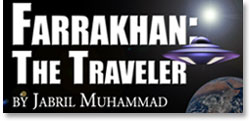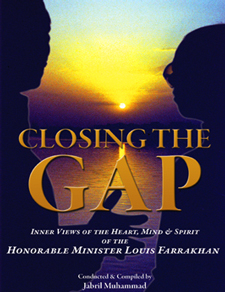JABRIL.MUHAMMAD
Previous Farrakhan The Traveler Articles
 The following material was originally published in Vol. 25; No. 19 of The Final Call Newspaper:
The following material was originally published in Vol. 25; No. 19 of The Final Call Newspaper:
“On the other hand, Abu Sufyan witnessed some aspects of the ties which united the Muslim community. He saw that the Muslims were very happy with their new faith and recognized that Allah had bestowed on them His grace when He sent Muhammad with His message to them. None of them had any doubts about the justice of their cause. Moreover, love was the predominant sentiment in the Muslim camp. All the Muslims loved one another, and the Prophet was dearer to any one of them than his own parents or children. Indeed, they loved the Prophet more than they loved themselves.” (Page 573 of Muhammad: Man and Prophet by Adil Salahi.
***
The love of the Muslims of 1,400 years ago, of whom Mr. Salahi wrote, was a sign of the love being generated in America by Master Fard Muhammad through the Honorable Elijah Muhammad and the Honorable Minister Louis Farrakhan–believe it or not.
To continue from last week’s article.
“Mr. Asad translates the Arabic of this verse this way:
‘And as for that young man, his parents were (true) believers–whereas we had every reason to fear that he would bring bitter grief upon them by (his) overweening wickedness and denial of all truth: and so We desired that their Sustainer grant them in his stead (a child) of greater purity than him and close (to them) in loving tenderness.’
“Here is Mr. Asad’s footnote #78 to the words in the passage above. ‘Literally, ‘we feared’–but it should be borne in mind that, beyond this primary meaning, the very khashiya sometimes denotes ‘he had reason to fear’ and, consequently, ‘he knew’, that is, that something bad would happen…and so we may assume that the sages’ expression of ‘fear’ was synonymous with positive ‘knowledge’ gained through outward evidence or through mystic insight (the latter being more probable, as indicated by his statement in the second paragraph of the next verse, ‘I did not do (any of) this of my own accord.’)
“Let us remember, what may be mystic to some, or most, may be common place to others, or to a few. To state it another way; what may either confuse or be paradoxical to one, may be relatively simple to another.
“Now, ‘Moses’ charged:
‘You have killed an innocent man who has done no harm. Surely you have committed a wicked crime.” (Dawood’s translation.)
“A few other translations, include words, to the effect that ‘Moses’ said the youth was innocent of having slain another and that he, the teacher, had done a hideous or horrible thing.
“How would the judges of this world judge this matter if it were brought to them, in their courts? Is there sufficient wisdom–legal and otherwise–to provide the means by which justice (if not equity) could be achieved in these matters? Suppose this ‘Moses’ could bring his teacher into the courts of this modern ‘sophisticated’ world? Would the standards implied in the reaction, or in the charges of the student, be adequate to find the wise man guilty as charged?
“Look at Mr. Asad’s translation of the Arabic of the wise man’s words: “And I did not do (any of) this on my own accord: this is the real meaning of all (those events) that thou weren’t unable to bear with patience.” Mr. Dawood translates the same words: ‘What I did was not done by my will. That is the meaning of what you could not bear to watch with patience.’
 |
Closing The Gap by Jabril Muhammad Inner Views of the Heart, Mind & Sprit of the Honorable Minister Louis Farrakhan Click here to Order |
“Mr. Asad’s translation has this footnote to this point that the wise man made, cited in the previous paragraph: ‘implying that whatever He had done, was done under the impulsion of a higher truth–the mystic insight which revealed to him the reality behind the outward appearance of things and made him a conscious particle in God’s unfathomable plan. This explains the use of the plural ‘we’ in verses 80-81, as well as, the direct attribution in the first paragraph of verse 82, of a concrete human action to God’s will….’
“It is interesting that the wise man used the word ‘I’ in explaining what he did to the boat, but he used the word ‘We’ when he explained his actions respecting the killing of the boy. Mr. Asad did a good job, as far as he went, in explaining this.
“Suppose you were a juror, in the court, where the wise man was on trial? Given all of the facts, how would you judge this case? Whose side would you take? Why? What would be the reasoning that underlay, or out of which you reached your verdict? Would you really be convinced by a man, who had done what he (the wise-man) was charged with, whose defense was that he did what he did by the guidance of God; by the will of God? What evidence, in support of his position, would satisfy your mind and heart that the Great Master of the universe was the ultimate Author of this man’s acts and, therefore, he was 100% justified in doing as he did?
“Further, even if you were already convinced that this wise-man did what he did from higher knowledge, deeper insight and wisdom than anyone else you knew; what could you be told that would make sense to you? What kind of presentation would convince you of the rightness of the wise-man’s actions that you would–not just be willing to–but you would go out into the public and defend him with your life?
“You say you would defend him? Ok. Let us see. Suppose the boat that he damaged was YOUR boat? YOUR car? YOUR horse? YOUR entire wardrobe? YOUR jewelry? YOUR furniture? YOUR whatever YOU own of material possessions? Would YOU still defend him?
“Now, suppose that boy, who was killed, was YOUR boy. Would YOU still publicly defend him? What would be YOUR response after YOU got over the shock? And the pain? And after YOU got over the after-shock? And more pain? And the initial confusion? And the effects of the confusion? Come now, would not you say, instead, ‘This has gone too far! I reject this man. He is no wise man. He is a …?
“Put yourself in the shoes of those parents, in that passage of the Holy Qur’an, wherein their little boy (according to other translations, he was a young man) was killed; for apparently no good reason at all. Could, or would YOU accept THIS explanation? Would you accept THE ANSWER of the wise man? Or, would you consider him an insane and evil fool, with no divine backing at all?
“If we are in the time when God wants to be fully known, then this is the time when we can understand His purpose, intent and behaviour–to a larger extent than ever before or possible–infused in such acts as described in this wise-man’s behaviour–which contains signs of similar behaviour in some of God’s servants today. (Surah 18, section 9 & 10)
***
“Before we go further, consider Joseph’s power to love and to forgive. In an earlier chapter, these words were quoted from a book and copied into a Bible in 1962. These words were on ‘love.’ (Although it did not cover all that divine love is, let us consider it again, in light of the Holy Qur’an’s words about this man with whom Moses traveled, and the behaviour of Joseph in relation to his brothers). They read:
“ ‘Love is a capacity for the experience of concern, responsibility, respect and understanding of another person and the intense desire for that person’s growth.’ ”
More next issue, Allah willing.












